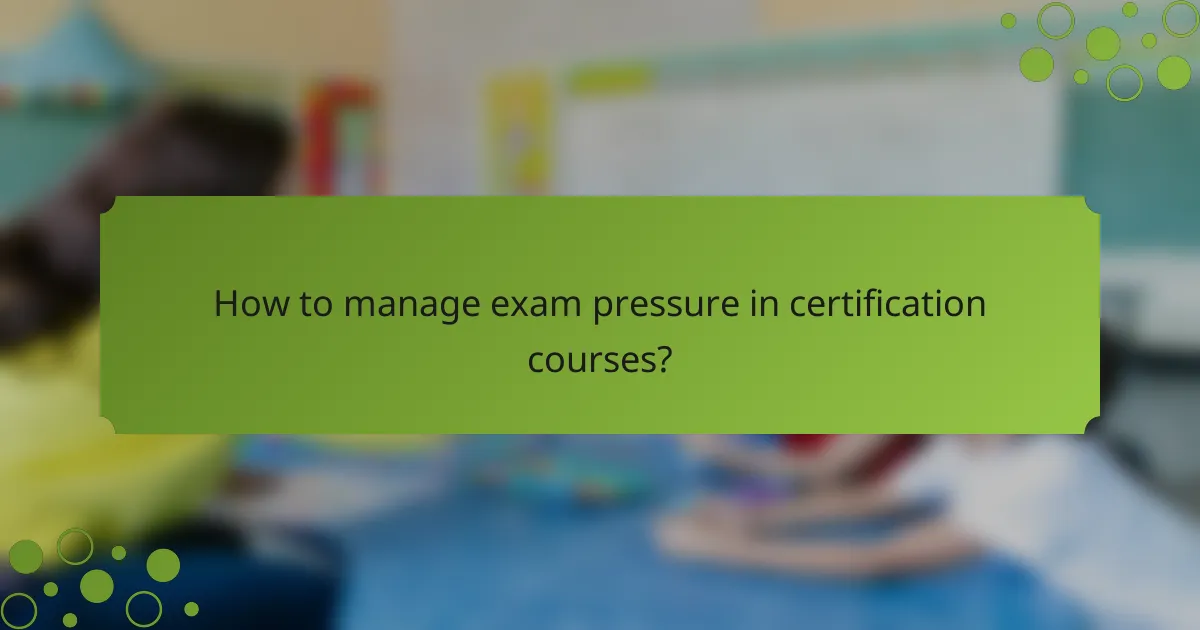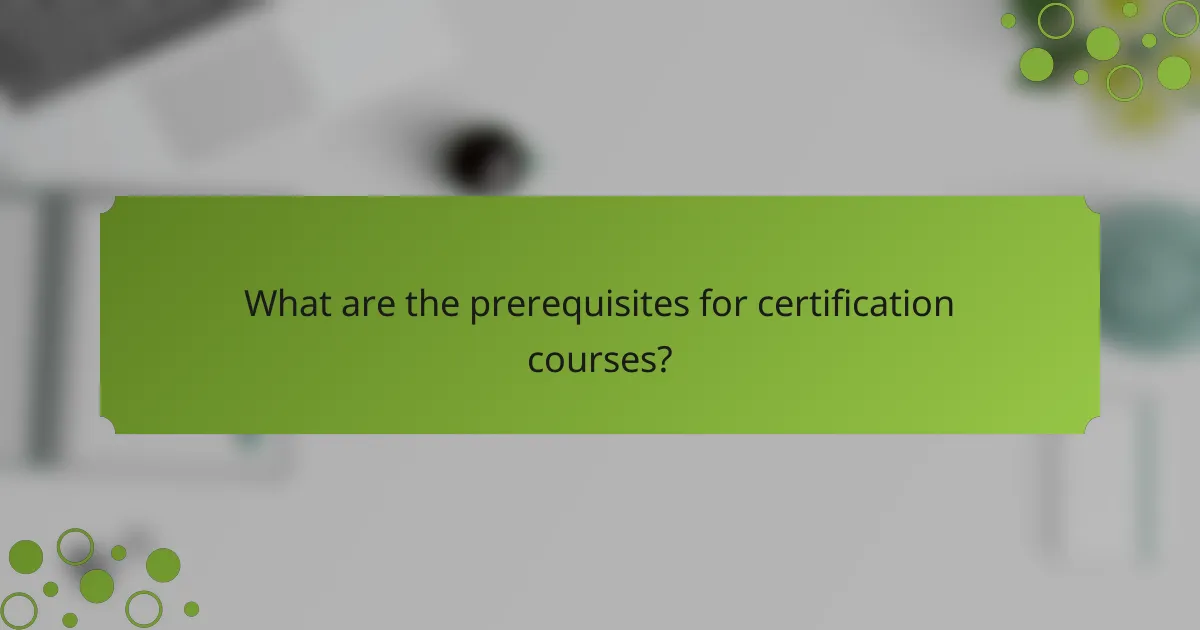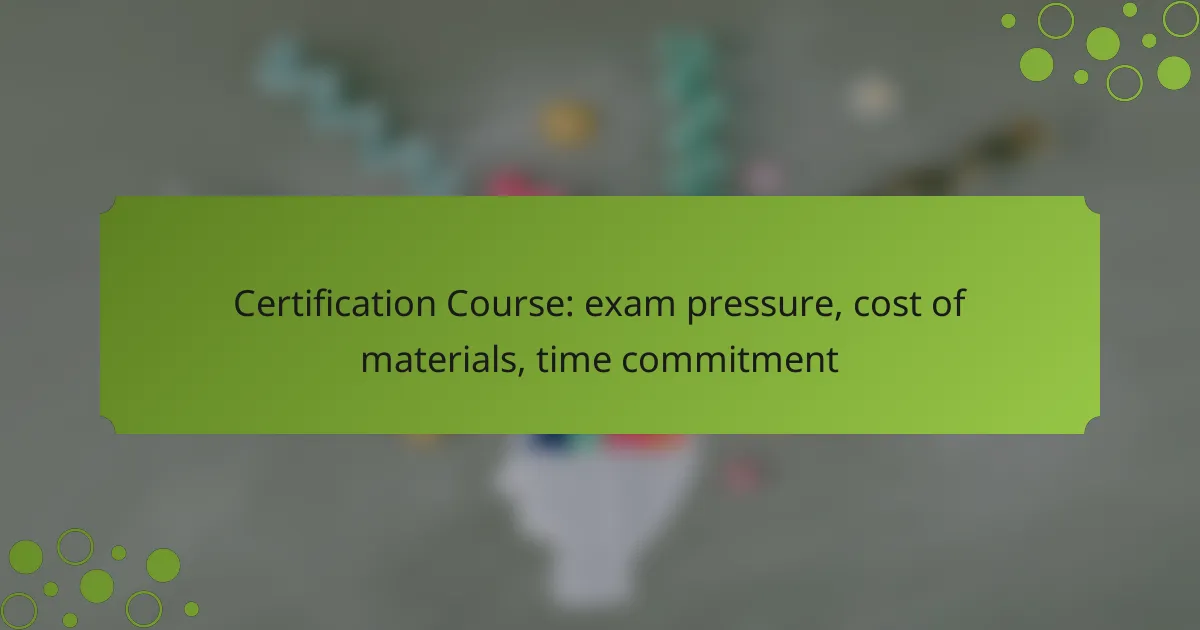Embarking on a certification course requires careful consideration of exam pressure, material costs, and time commitments. Effective preparation and stress management techniques can help alleviate anxiety during exams. Additionally, students should budget several hundred to over a thousand Canadian dollars for necessary materials, while being prepared to invest several hours each week over a period of weeks to months for successful completion.

How to manage exam pressure in certification courses?
Managing exam pressure in certification courses involves effective preparation, time management, and stress relief techniques. By implementing structured study habits and coping strategies, you can enhance your performance and reduce anxiety.
Effective study techniques
Utilizing effective study techniques can significantly alleviate exam pressure. Techniques such as active recall, spaced repetition, and practice tests help reinforce knowledge and improve retention. For instance, dedicating 30 minutes daily to practice questions can boost confidence and familiarity with the exam format.
Group study sessions can also be beneficial. Collaborating with peers allows for diverse perspectives and clarifies difficult concepts. However, ensure these sessions remain focused to avoid distractions.
Time management strategies
Implementing time management strategies is crucial for balancing study commitments and personal life. Create a study schedule that allocates specific time blocks for each subject, ensuring you cover all material well before the exam date. Aim for at least 10-15 hours of study per week, adjusting as needed based on your comfort with the material.
Prioritize tasks using a to-do list, focusing on high-impact areas first. Break larger topics into manageable sections to avoid feeling overwhelmed. Regularly review your progress to stay on track and make adjustments as necessary.
Stress relief practices
Incorporating stress relief practices into your routine can help maintain focus and calm. Techniques such as mindfulness meditation, deep breathing exercises, or light physical activity can reduce anxiety levels. Aim for at least 10 minutes of mindfulness practice daily to enhance your mental clarity.
Additionally, ensure you maintain a healthy lifestyle by getting adequate sleep, eating nutritious meals, and staying hydrated. These factors contribute significantly to your overall well-being and can improve your ability to cope with exam pressure.

What is the cost of materials for certification courses in Canada?
The cost of materials for certification courses in Canada can vary significantly based on the program and institution. Generally, students should budget several hundred to over a thousand Canadian dollars for textbooks, online resources, and additional fees associated with certification.
Average textbook prices
Textbook prices for certification courses in Canada typically range from CAD 50 to CAD 300 per book. Many courses require multiple textbooks, which can quickly add up. Consider purchasing used books or renting them to reduce costs.
Online resource subscriptions
Online resource subscriptions can cost between CAD 20 and CAD 100 per month, depending on the provider and the resources offered. Some certification programs may include access to online materials in their fees, so check with your institution to avoid duplicate expenses.
Additional fees for certification
In addition to materials, certification courses often have extra fees that can range from CAD 100 to CAD 500. These may include application fees, exam fees, and costs for certification preparation workshops. Always review the specific requirements of your certification program to anticipate these expenses accurately.

What is the time commitment for certification courses?
The time commitment for certification courses varies widely depending on the program and individual learning pace. Generally, students can expect to dedicate several hours each week over a span of weeks to months to successfully complete their certification.
Weekly study hours required
Most certification courses recommend a study schedule of around 5 to 15 hours per week. This range allows for a balance between coursework, assignments, and exam preparation. The specific hours may depend on the complexity of the material and the student’s prior knowledge.
For example, a technical certification may require more intensive study hours, while a less complex course might allow for fewer hours each week. It’s crucial to assess your own learning style and adjust your study time accordingly.
Duration of the course
The duration of certification courses typically spans from a few weeks to several months. Shorter courses may last around 4 to 8 weeks, while more comprehensive programs can extend up to 6 months or longer. The length often reflects the depth of the content covered.
When selecting a course, consider how the duration aligns with your personal schedule and goals. Some courses may offer accelerated options for those looking to complete their certification quickly.
Flexible scheduling options
Many certification programs offer flexible scheduling options to accommodate varying lifestyles. Online courses, for instance, often allow students to study at their own pace, making it easier to fit learning into busy schedules.
Additionally, some programs provide evening or weekend classes, which can be beneficial for working professionals. Look for courses that offer recorded lectures or modular content that can be accessed anytime to maximize flexibility.

What are the prerequisites for certification courses?
Certification courses typically require a foundational level of knowledge and specific qualifications to ensure participants can successfully engage with the material. Understanding these prerequisites is essential for anyone considering enrollment.
Required prior knowledge
Most certification courses expect participants to have a basic understanding of the subject matter. For example, a course in project management might require familiarity with key concepts like project life cycles and stakeholder management.
It’s advisable to review the course syllabus beforehand to identify any specific knowledge areas that may need to be brushed up on. Online resources, textbooks, or introductory courses can be helpful for filling in gaps in understanding.
Necessary qualifications
Some certification programs may require certain qualifications, such as a high school diploma or a relevant undergraduate degree. For instance, IT certification courses often expect candidates to have a background in computer science or a related field.
Additionally, certain certifications may have experience requirements, such as a minimum number of years working in the industry. Always check the specific requirements of the certification body to ensure you meet the criteria before applying.

How to choose the right certification course?
Selecting the right certification course involves evaluating several key factors, including course accreditation, instructor qualifications, and student reviews. Understanding these elements can help ensure you invest your time and resources wisely.
Course accreditation
Course accreditation is crucial as it indicates that the program meets certain educational standards. Look for courses accredited by recognized organizations or institutions relevant to your field, which can enhance your credibility in the job market.
Check if the accrediting body is respected within your industry. For example, in the IT sector, certifications from CompTIA or Cisco are often more valued than non-accredited options. This can significantly impact your career opportunities.
Instructor qualifications
Instructor qualifications are essential for a quality learning experience. Ensure that the instructors have relevant industry experience and educational backgrounds that align with the course content.
Instructors with professional certifications and teaching experience can provide insights that enhance understanding. Look for courses where instructors have a track record of successful student outcomes, as this often reflects their teaching effectiveness.
Student reviews and outcomes
Student reviews and outcomes provide valuable insights into the effectiveness of a certification course. Look for testimonials and ratings on independent platforms to gauge student satisfaction and success rates.
Consider the percentage of students who pass the certification exam after completing the course. A course with a high pass rate, typically above 70%, can indicate a well-structured program that prepares students adequately for the exam.

What are the benefits of online certification courses?
Online certification courses offer flexibility and accessibility, allowing learners to enhance their skills without the constraints of traditional classroom settings. They cater to various schedules and learning styles, making education more attainable for a wider audience.
Accessibility and convenience
Online certification courses are designed to be accessible from anywhere with an internet connection. This means learners can study at their own pace, fitting their education around work or personal commitments.
Many platforms provide mobile-friendly content, enabling users to learn on-the-go. This convenience can significantly reduce the stress associated with commuting to a physical location.
Cost-effectiveness
Online certification courses often come at a lower price point compared to traditional in-person classes. Tuition fees can vary widely, but many online options are available for a few hundred to a couple of thousand dollars, making them budget-friendly.
Additionally, learners save on travel and accommodation costs, which can add up significantly. Some platforms even offer free courses or financial aid options, further reducing the financial burden.
Variety of available subjects
There is a vast array of subjects available through online certification courses, ranging from technology and business to arts and health. This variety allows learners to pursue their interests or career goals without being limited by local offerings.
Many reputable institutions and organizations provide courses, ensuring quality education across diverse fields. This wide selection enables individuals to find certifications that align with their specific career paths or personal development aspirations.

What emerging trends are shaping certification courses?
Certification courses are increasingly influenced by technological advancements, evolving industry demands, and a focus on flexible learning. These trends reflect a shift toward online platforms, competency-based assessments, and personalized learning experiences.
Exam pressure
Exam pressure in certification courses can significantly impact a candidate’s performance and overall experience. Many learners face anxiety due to high stakes associated with passing these exams, which can lead to stress and burnout.
To manage exam pressure, candidates should adopt effective study techniques, such as spaced repetition and practice tests. Creating a structured study schedule can also help alleviate anxiety by ensuring adequate preparation time.
Cost of materials
The cost of materials for certification courses varies widely, often ranging from low tens to several hundred dollars, depending on the course’s complexity and provider. This includes textbooks, online resources, and exam fees.
To minimize expenses, consider using free or low-cost resources available online, such as open educational resources or community forums. Additionally, some employers may offer financial assistance or reimbursements for certification-related costs.
Time commitment
Time commitment for certification courses can vary based on the course format and individual learning pace, typically requiring anywhere from a few weeks to several months of dedicated study. Understanding the expected time investment is crucial for effective planning.
To optimize your time commitment, set clear goals and break down the curriculum into manageable sections. Regularly assess your progress to stay on track and adjust your study plan as needed to ensure successful completion.



